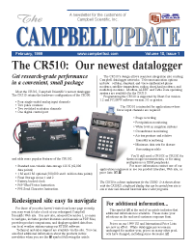Collabourative effort creates soil water instrumentation Campbell Scientific is adding a new product to its line of soil water measurement instrumentation. The HydroSense™ is the result of a collaborative effort between CSI and Campbell Scientific Australia (CSA; Townsville, QLD).
_x000D_The CD620 handheld display, manufactured by CSA, is built around a PIC microcontroller. The display unit connects to the CS620 sensor, developed by CSI, via a two-meter coiled cable. The probe consists of an electronic circuit encapsulated in epoxy. Replaceable rods are 5 mm in diameter and are available in 12- and 20-cm lengths. A measurement is made by fully inserting the rods into the soil and pressing the READ button. The measurement result is provided on a two-line alphanumeric display.
The HydroSense’s two operating modes provide flexibility in a variety of applications. The water content measurement mode applies factory calibrations to the probe output and displays volumetric water content in percent. Also displayed in this mode are the period of the probe output signal and the length of rods being used.
_x000D_The water deficit mode allows the user to set lower and upper water content references by taking measurements under those conditions and storing the values in memory. Up to five sets of reference values can be stored allowing specific monitoring under different crop and soil combinations. Once ref-erence values are stored, subsequent measurements provide a display of the relative water content and the water deficit. Relative water content ranges from 0 to 100 percent and corresponds to the lower and upper reference values, respectively. The deficit value indicates the amount of water which must be added to bring the water content to the upper reference value.
_x000D_Operating modes are easily switched by holding one front panel button down while the other is pressed. Pressing either button wakes the HydroSense from sleep mode, which occurs automatically after about two minutes of measurement inactivity. Two AA batteries provide enough power for thousands of instantaneous, high precision measurements.

